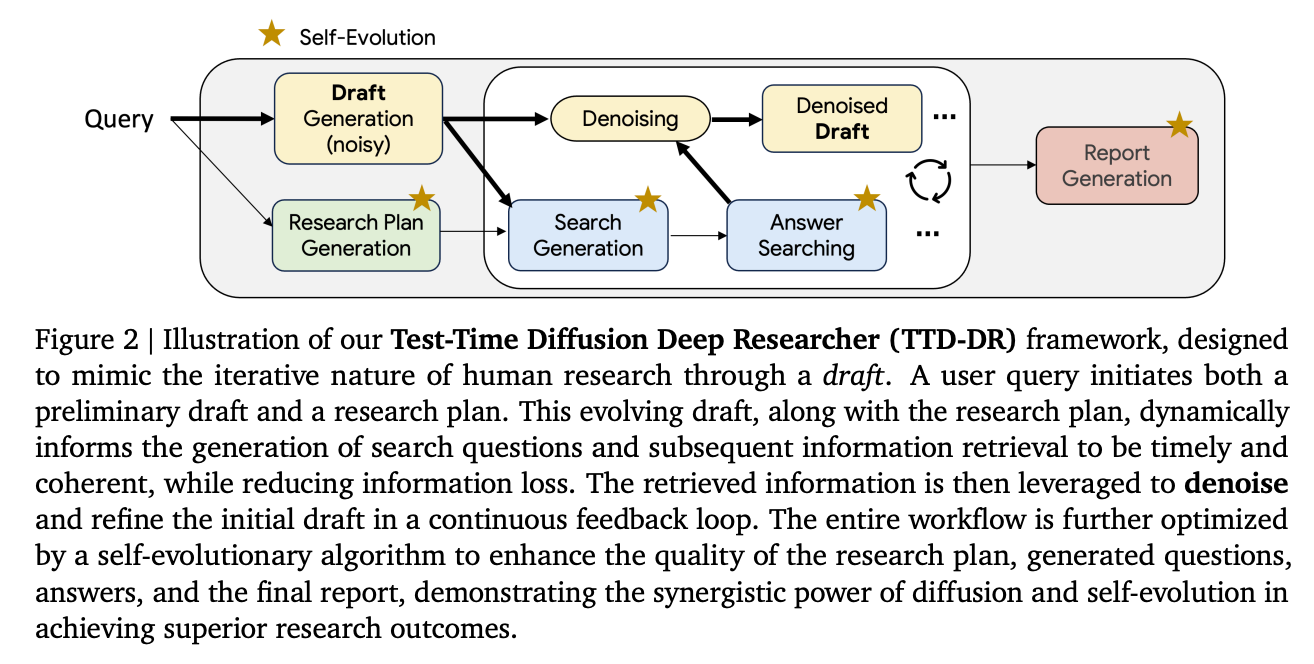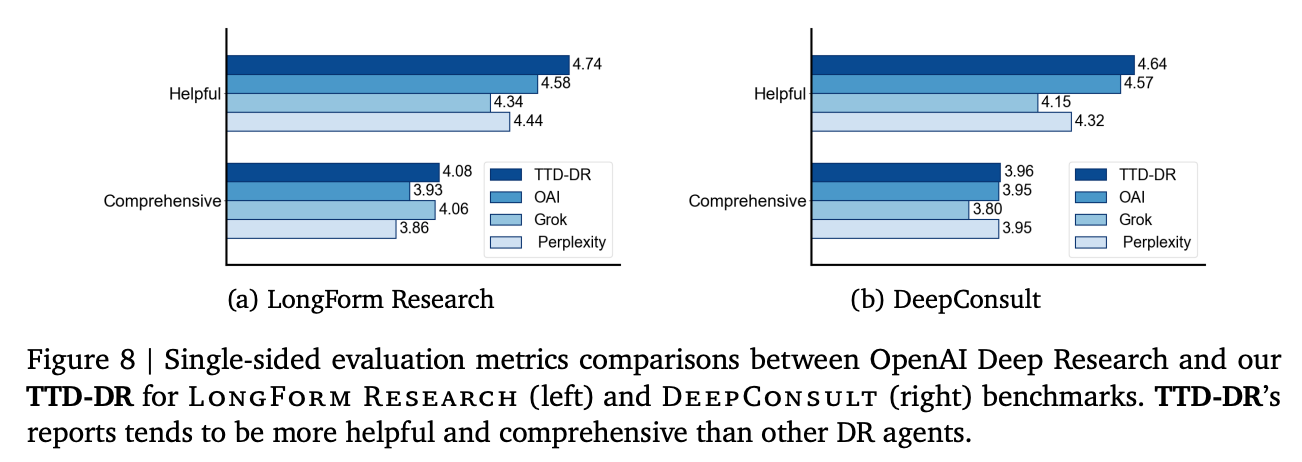AI Research
Google AI Introduces the Test-Time Diffusion Deep Researcher (TTD-DR): A Human-Inspired Diffusion Framework for Advanced Deep Research Agents

Deep Research (DR) agents have rapidly gained popularity in both research and industry, thanks to recent progress in LLMs. However, most popular public DR agents are not designed with human thinking and writing processes in mind. They often lack structured steps that support human researchers, such as drafting, searching, and using feedback. Current DR agents compile test-time algorithms and various tools without cohesive frameworks, highlighting the critical need for purpose-built frameworks that can match or excel human research capabilities. The absence of human-inspired cognitive processes in current methods creates a gap between how humans do research and how AI agents handle complex research tasks.
Existing works, such as test-time scaling, utilize iterative refinement algorithms, debate mechanisms, tournaments for hypothesis ranking, and self-critique systems to generate research proposals. Multi-agent systems utilize planners, coordinators, researchers, and reporters to produce detailed responses, while some frameworks enable human co-pilot modes for feedback integration. Agent tuning approaches focus on training through multitask learning objectives, component-wise supervised fine-tuning, and reinforcement learning to improve search and browsing capabilities. LLM diffusion models attempt to break autoregressive sampling assumptions by generating complete noisy drafts and iteratively denoising tokens for high-quality outputs.
Researchers at Google introduced Test-Time Diffusion Deep Researcher (TTD-DR), inspired by the iterative nature of human research through repeated cycles of searching, thinking, and refining. It conceptualizes research report generation as a diffusion process, starting with a draft that serves as an updated outline and evolving foundation to guide research direction. The draft undergoes iterative refinement through a “denoising” process, dynamically informed by a retrieval mechanism that incorporates external information at each step. This draft-centric design makes report writing more timely and coherent while reducing information loss during iterative search processes. TTD-DR achieves state-of-the-art results on benchmarks that require intensive search and multi-hop reasoning.
The TTD-DR framework addresses limitations of existing DR agents that employ linear or parallelized processes. The proposed backbone DR agent contains three major stages: Research Plan Generation, Iterative Search and Synthesis, and Final Report Generation, each containing unit LLM agents, workflows, and agent states. The agent utilizes self-evolving algorithms to enhance the performance of each stage, helping it to find and preserve high-quality context. The proposed algorithm, inspired by recent self-evolution work, is implemented in a parallel workflow along with sequential and loop workflows. This algorithm can be applied to all three stages of agents to improve overall output quality.
In side-by-side comparisons with OpenAI Deep Research, TTD-DR achieves 69.1% and 74.5% win rates for long-form research report generation tasks, while outperforming by 4.8%, 7.7%, and 1.7% on three research datasets with short-form ground-truth answers. It shows strong performance in Helpfulness and Comprehensiveness auto-rater scores, especially on LongForm Research datasets. Moreover, the self-evolution algorithm achieves 60.9% and 59.8% win rates against OpenAI Deep Research on LongForm Research and DeepConsult. The correctness score shows an enhancement of 1.5% and 2.8% on HLE datasets, though the performance on GAIA remains 4.4% below OpenAI DR. The incorporation of Diffusion with Retrieval leads to substantial gains over OpenAI Deep Research across all benchmarks.

In conclusion, Google presents TTD-DR, a method that addresses fundamental limitations through human-inspired cognitive design. The framework’s approach conceptualizes research report generation as a diffusion process, utilizing an updatable draft skeleton that guides research direction. TTD-DR, enhanced by self-evolutionary algorithms applied to each workflow component, ensures high-quality context generation throughout the research process. Moreover, evaluations demonstrate that TTD-DR’s state-of-the-art performance across various benchmarks that require intensive search and multi-hop reasoning, with superior results in both comprehensive long-form research reports and concise multi-hop reasoning tasks.
Check out the Paper here. Feel free to check our Tutorials page on AI Agent and Agentic AI for various applications. Also, feel free to follow us on Twitter and don’t forget to join our 100k+ ML SubReddit and Subscribe to our Newsletter.
Sajjad Ansari is a final year undergraduate from IIT Kharagpur. As a Tech enthusiast, he delves into the practical applications of AI with a focus on understanding the impact of AI technologies and their real-world implications. He aims to articulate complex AI concepts in a clear and accessible manner.
AI Research
University Of Utah Teams With HPE, NVIDIA To Boost AI Research

The University of Utah (the U) is planning to join forces with two powerhouse tech firms to accelerate research and discovery using artificial intelligence (AI). The agreement with Hewlett Packard Enterprise (HPE) and AI chipmaker NVIDIA will amplify the U’s capacity for understanding cancer, Alzheimer’s disease, mental health, and genetics. The initiative is projected to enable medical breakthroughs, driving innovation, and scientific discovery across disciplines.
“The U has a proud legacy of pioneering technological breakthroughs,” said Taylor Randall, president of the University of Utah. “Our goal is to make the state awash in computing power by building a robust AI ecosystem benefiting our entire system of higher education, driving research to find new cures, and igniting Utah’s entrepreneurial spirit.”
The partnership, which includes a $50 million investment of funds from both public and philanthropic sources, is projected to increase the U’s computing capacity 3.5-fold. The flagship school’s Board of Trustees gave preliminary approval to the proposed arrangement on September 9.
The structure paves a path for substantial advances in computing storage and infrastructure required for Utah-based projects in AI and innovation. The goal is to lay the foundation for a scalable AI ecosystem available to researchers, learners, and entrepreneurs across Utah. The multi-year initiative would build upon existing capabilities in AI, giving the U access to substantially more computing power.
Brynn and Peter Huntsman along with the Huntsman Family Foundation will provide a lead philanthropic gift to the U that is intended to initiate the project and help encourage other supporters to make investments required to move the work forward through AI “supercomputer” systems designed to handle enormous processing and storage needs. The university will seek remaining funds from the state of Utah and other sources.
“This AI initiative will accelerate world class cancer research that enhances capabilities in ways we hardly imagined just a few years ago,” said Peter Huntsman, CEO and chairman, Huntsman Cancer Foundation. “Huntsman Cancer Foundation recently announced our commitment to support the expansion of the educational, research, and clinical care capacity of the world renown Huntsman Cancer Institute in Vineyard, Utah, which will serve as a hub for cancer AI research. These investments will speed discoveries and enhance the state of Utah’s leadership in AI education and economic opportunity.”
Mental health will be a major focus of the AI research endeavor.
“As the Huntsman Mental Health Institute opens its new 185,000-square-foot Translational Research Building this coming year, we’re looking forward to increasing momentum around mental health research, including the impact of this technology,” said Christena Huntsman Durham, Huntsman Mental Health Foundation CEO and co-chair. “We know so many people are struggling with mental health challenges; we’re thrilled we will be able to move even faster to get help to those who need it most.”
Check out all the latest news related to Utah economic development, corporate relocation, corporate expansion and site selection.
AI Research
F5 to acquire AI security firm CalypsoAI for $180 million

F5, a Seattle-based application delivery and security company, announced Thursday it will acquire Dublin-based CalypsoAI for $180 million in cash, highlighting the mounting security challenges enterprises face as they rapidly integrate artificial intelligence into their operations.
The acquisition comes as companies across industries rush to deploy generative AI systems while grappling with new categories of cybersecurity threats that traditional security tools struggle to address. CalypsoAI, founded in 2018, specializes in protecting AI systems against emerging attack methods, including prompt injection and jailbreak attacks.
“AI is redefining enterprise architecture and the attack surface companies must defend,” said François Locoh-Donou, F5’s president and CEO. The company plans to integrate CalypsoAI’s capabilities into its Application Delivery and Security Platform to create what it describes as a comprehensive AI security solution.
Companies are embedding AI into products and operations at an unprecedented pace, but this rapid adoption has created compliance gaps and heightened regulatory scrutiny. CalypsoAI addresses these challenges through what the company calls “model-agnostic” security, providing protection regardless of which AI models or cloud providers enterprises use.
The platform conducts automated red-team testing against thousands of attack scenarios monthly, generating risk assessments and implementing real-time guardrails to prevent data leakage and policy violations.
“Enterprises want to move fast with AI while reducing the risk of data leaks, unsafe outputs, or compliance failures,” said CalypsoAI CEO Donnchadh Casey. The company’s approach focuses on the inference layer where AI models process requests, rather than securing the models themselves.
The acquisition comes during a flurry of similar moves by established companies in the cybersecurity space that are looking to add AI-powered offerings to their customers.
F5 has also been active this year with what it considers strategic purchases. The company acquired San Francisco-based Fletch in June and observability firm MantisNet in August, demonstrating a pattern of building capabilities through acquisition rather than internal development.
The deal is expected to close by Sept. 30.
AI Research
Nebius Raises $3.7 Billion in Wake of Microsoft AI Deal

Dutch cloud computing company Nebius has raised $3.75 million via sales of stock and convertible notes.
-

 Business2 weeks ago
Business2 weeks agoThe Guardian view on Trump and the Fed: independence is no substitute for accountability | Editorial
-
Tools & Platforms1 month ago
Building Trust in Military AI Starts with Opening the Black Box – War on the Rocks
-

 Ethics & Policy2 months ago
Ethics & Policy2 months agoSDAIA Supports Saudi Arabia’s Leadership in Shaping Global AI Ethics, Policy, and Research – وكالة الأنباء السعودية
-

 Events & Conferences4 months ago
Events & Conferences4 months agoJourney to 1000 models: Scaling Instagram’s recommendation system
-

 Jobs & Careers2 months ago
Jobs & Careers2 months agoMumbai-based Perplexity Alternative Has 60k+ Users Without Funding
-

 Podcasts & Talks2 months ago
Podcasts & Talks2 months agoHappy 4th of July! 🎆 Made with Veo 3 in Gemini
-

 Education2 months ago
Education2 months agoMacron says UK and France have duty to tackle illegal migration ‘with humanity, solidarity and firmness’ – UK politics live | Politics
-

 Education2 months ago
Education2 months agoVEX Robotics launches AI-powered classroom robotics system
-

 Funding & Business2 months ago
Funding & Business2 months agoKayak and Expedia race to build AI travel agents that turn social posts into itineraries
-

 Podcasts & Talks2 months ago
Podcasts & Talks2 months agoOpenAI 🤝 @teamganassi



